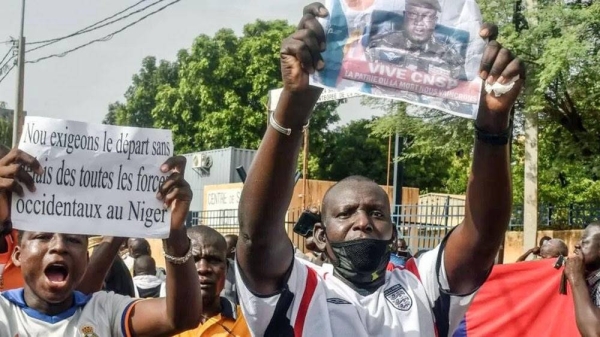
Reactions poured in on Thursday to the ouster of Sudanese President Omar al-Bashir from power in a military coup as the United Nations Security Council prepared to convene behind closed door to address the developments in the African country.
Egypt said it was “closely” monitoring the developments in its neighboring country, saying it “completely supports the choices of the brotherly Sudanese people and their free will in determining their future.”
A Foreign Ministry statement expressed its “complete faith that the people and national army will be able to overcome this critical phase and its challenges in order to meet the aspirations and ambitions to achieve stability, prosperity and development.”
It stressed that Egypt was determined to maintain the strong bonds with Khartoum and called on the international community to support the choices of the people.
The United States, France, Britain, Germany, Belgium and Poland demanded that the Security Council convene to address the developments in Sudan. Diplomats predicted that the council will meet Friday.
The US State Department, while declining to declare the takeover a coup, said it supported a peaceful and democratic Sudan and believed the Sudanese people should be allowed a peaceful transition sooner than only in two years.
“The Sudanese people should determine who leads them in their future,” spokesman Robert Palladino said at a news briefing. “The Sudanese people have been clear that they have been demanding a civilian-led transition. They should be allowed to do so sooner than two years from now.”
Military leaders in Sudan said presidential elections would take place after a two-year period of military rule following the ouster of Bashir. The military has also suspended the constitution and imposed an emergency clampdown that risks enflaming protesters who have demanded civilian democratic change.
British Foreign Secretary Jeremy Hunt said two years of potential military rule in Sudan "is not the answer" for "real change" in the country.
Hunt tweeted Thursday that Sudan needs "a swift move to an inclusive, representative, civilian leadership" and an end to violence.
Sudans military ousted Bashir hours earlier in response to nearly four months of escalating popular protests in which dozens have been killed.
The European Union urged the army to carry out a "swift" handover to civilian rule.
"Only a credible and inclusive political process can meet the aspirations of the Sudanese people and lead to the political and economic reforms the country needs," the blocs diplomatic chief Federica Mogherini said.
In Moscow, presidency spokesman Dmitry Peskov said that the developments in Sudan were an “internal affair,” hoping that order will be restored in line with the constitution.
“We are closely monitoring the situation and hope that an escalation will be averted,” he added, saying that a solution to the crisis would be resolved by the Sudanese people themselves.
Meanwhile, Turkish President Recep Tayyip Erdogan called for national reconciliation in Sudan after Bashir’s ouster, hoping Sudan can overcome its upheaval peacefully through "national conciliation" and urged it to try to operate "a normal democratic process."
“We have deep-rooted historic relations with Sudan. We of course support the continuation of these deep-rooted ties,” he said.
The African Union criticized the coup and called for restraint.
It said that a military takeover was “no the appropriate answer to confronting challenges facing Sudan.”












